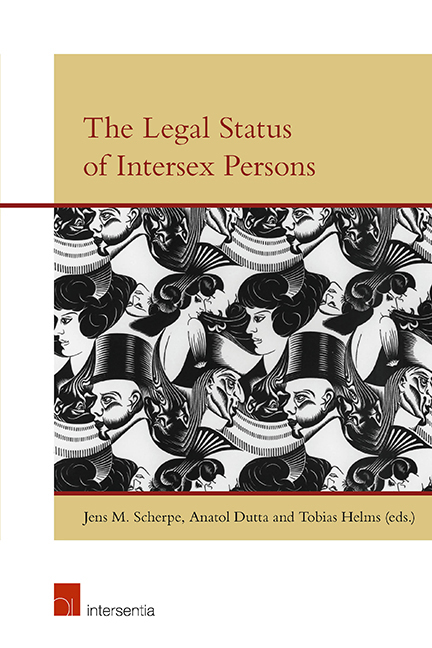Book contents
- Frontmatter
- Preface
- Contents
- List of Contributors
- The Legal Status of Intersex Persons: An Introduction
- Malta Declaration
- Darlington Statement
- Vienna Statement
- PART I MEDICINE AND PSYCHOLOGY
- PART II THEOLOGY AND LEGAL HISTORY
- PART III TRANSGENDER, TRANSSEXUALITY AND INTERSEX
- PART IV NATIONAL LEGAL DEVELOPMENTS
- Australia
- Sweden
- India
- The Netherlands
- France
- Colombia (The Colombian Constitutional Court)
- United States
- Malta
- Germany (The 2013 German Law)
- Germany (German Inter-Ministerial Working Group)
- Germany (Gender Diversity in Law)
- PART V PRIVATE INTERNATIONAL LAW ASPECTS OF INTERSEX
- PART VI INTERSEX AND HUMAN RIGHTS
France
from PART IV - NATIONAL LEGAL DEVELOPMENTS
Published online by Cambridge University Press: 31 January 2019
- Frontmatter
- Preface
- Contents
- List of Contributors
- The Legal Status of Intersex Persons: An Introduction
- Malta Declaration
- Darlington Statement
- Vienna Statement
- PART I MEDICINE AND PSYCHOLOGY
- PART II THEOLOGY AND LEGAL HISTORY
- PART III TRANSGENDER, TRANSSEXUALITY AND INTERSEX
- PART IV NATIONAL LEGAL DEVELOPMENTS
- Australia
- Sweden
- India
- The Netherlands
- France
- Colombia (The Colombian Constitutional Court)
- United States
- Malta
- Germany (The 2013 German Law)
- Germany (German Inter-Ministerial Working Group)
- Germany (Gender Diversity in Law)
- PART V PRIVATE INTERNATIONAL LAW ASPECTS OF INTERSEX
- PART VI INTERSEX AND HUMAN RIGHTS
Summary
INTRODUCTION
Attention to intersex persons in French legislation and regulation dates back to 1970 when an administrative instruction tried to deal with the issues raised by the birth of an intersex person. Since then, not much has happened, as French politicians either did not perceive this as a problem, or, more recently, clearly did not want to deal with the issue. However, recently, some ministerial questions were asked and some official reports were published. In February 2017, both the Senate and Human Rights Defender (ombudsman) issued reports on the situation of intersex persons. Public statements were also made by French officials, the most important by the President of the French Republic on 17 March 2017, in which he called for ‘a ban on surgeries performed on intersex infants which is increasingly regarded as a mutilation’. So far, these developments have not been not followed by legislative change. When the Senate had the opportunity to deal with the problems that intersex persons encounter regarding their sex marker/civil status, it refused to do so. This apparent lack of political interest led an intersex individual to decide, with the help of lawyers (including the author of this chapter), to turn to the courts in order to ask the judges whether or not it was possible for an intersex person to be registered with a neutral sex in France. the reason for this approach was that unlike politicians, courts have to answer the questions they are asked, even the Cour de cassation, which is one of the French Supreme Courts. However their hopes were dashed by that court on 4 May 2017. 12 On that day, the Cour de cassation held, for the first time ever in France, that no special sex marker could be granted to intersex individuals: ‘neutral’ (neutre) was deemed not to be available as a legal sex marker concerning civil status. Very recently, the same court also issued a judgment where it refused an intersex person the right to access to a criminal court on the basis of the limitation period.
- Type
- Chapter
- Information
- The Legal Status of Intersex Persons , pp. 305 - 318Publisher: IntersentiaPrint publication year: 2018
- 1
- Cited by

